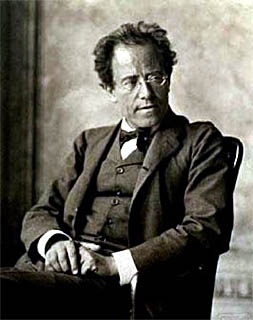
The genesis of
Das Lied has an interesting history. Mahler composed this massive work, a “song-symphony” in every sense except by name, over 1908-09, during a period when he was obsessed with issues of mortality, suffering and the possibility of afterlife. His elder daughter had died from diphtheria the previous year, and he was also diagnosed as having a serious heart condition. Around the same time, Mahler discovered a collection of Chinese poems translated into German by Hans Bethge, entitled
Die chinesische Flöte (The Chinese Flute)
. From this volume of eighty poems, Mahler picked ones by Li Bai, the most famous of all Chinese poets, as texts for the first, third, fourth and fifth songs. He also chose a poem by Qian Qi for the second song. The composer combined the poetry of Meng Hao-ran and Wang-Wei, rearranged and rewrote the last section with his own words for the final song, ‘Abschied’ (Farewell) excerpted on this collection.
The last song, equaling in length to the five previous songs combined and lasting almost thirty minutes, sits at the heart of this work. It is made up of two sections separated by an orchestral interlude. The mood is somber and heavy, matched by the sparse orchestration. It speaks of twilight, growing weary and going to sleep, and longing to bid one last farewell to a friend –surely an allegory of the protagonist’s impending death? At the last section of the song, after a lengthy funeral march-like orchestral interlude, with the words “Ich werde niemals in die Ferne schweifen” emerges a wondrous melody, transformed from thematic material heard earlier in the song. These last few lines of text, set to Mahler’s own words and lasting no more than three minutes or so, signifies a feeling of resignation, of resolution, of peaceful acceptance of one’s fate. This is for me one of the most personal and the most remarkable passages in Mahler’s oeuvre, and indeed of all song literature. Those of us who have had the privilege of witnessing a Maureen Forrester Das Lied, with her final words of ‘ewig, ewig...’ – it is something one will never forget.
Joseph K. So
Der Abschied
Die Sonne scheidet hinter dem Gebirge.
In alle Täler steigt der Abend nieder
Mit seinen Schatten, die voll Kühlung sind.
O sieh! Wie eine Silberbarke schwebt
Der Mond am blauen Himmelssee herauf.
Ich spüre eines feinen Windes Wehn
Hinter den dunklen Fichten!
Der Bach singt voller Wohllaut durch das Dunkel.
Die Blumen blassen im Dämmerschein.
Die Erde atmet voll von Ruh und Schlaf,
Alle Sehnsucht will nun träumen.
Die müden Menschen gehn heimwärts,
Um im Schlaf vergeßnes Glück
Und Jugend neu zu lernen!
Die Vögel hocken still in ihren Zweigen.
Die Welt schläft ein!
Es wehet kühl im Schatten meiner Fichten.
Ich stehe hier und harre meines Freundes;
Ich harre sein zum letzten Lebewohl.
Ich sehne mich, o Freund, an deiner Seite
Die Schönheit dieses Abends zu genießen.
Wo bleibst du? Du läßt mich lang allein!
Ich wandle auf und nieder mit meiner Laute
Auf Wegen, die vom weichen Grase schwellen.
O Schönheit! O ewigen Liebens - Lebenstrunkne Welt!
Er stieg vom Pferd und reichte ihm den Trunk
Des Abschieds dar. Er fragte ihn, wohin
Er führe und auch warum es müßte sein.
Er sprach, seine Stimme war umflort: Du, mein Freund,
Mir war auf dieser Welt das Glück nicht hold!
Wohin ich geh? Ich geh, ich wandre in die Berge.
Ich suche Ruhe für mein einsam Herz.
Ich wandle nach der Heimat, meiner Stätte.
Ich werde niemals in die Ferne schweifen.
Still ist mein Herz und harret seiner Stunde!
Die liebe Erde allüberall
Blüht auf im Lenz und grünt
Aufs neu! Allüberall und ewig
Blauen licht die Fernen!
Ewig... ewig
